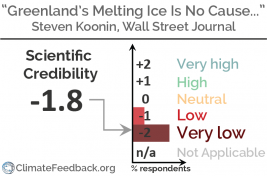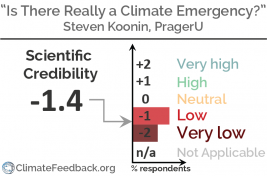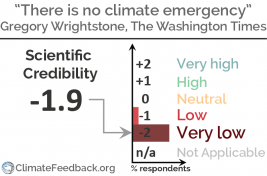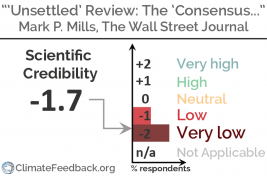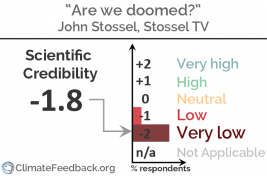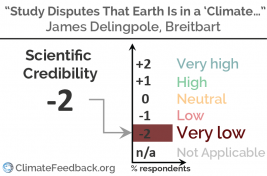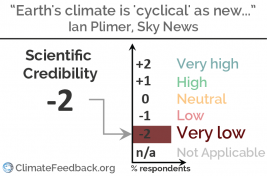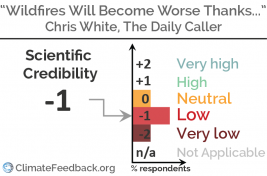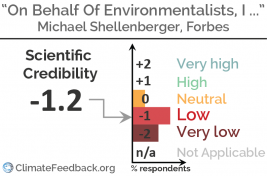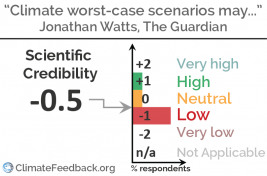.
Articles tagged as: Misleading definition
Wall Street Journal op-ed by Steven Koonin publishes misleading claims about how climate change influences Greenland ice melt
in Wall Street Journal, by Steve Koonin
Human-caused climate change is already accelerating Greenland’s melting and is predicted to continue to accelerate it in the future. In addition to Greenland, most glaciers around the planet are also melting at an accelerating pace. This melt, in addition to the expansion of the ocean as it warms, contributes to elevate sea level at an accelerating rate, threatening coastal cities around the globe.
— 24 Feb 2022
PragerU video on climate change repeats a range of misleading claims by Steven Koonin
in PragerU, by Steve Koonin
“The author of this video, Dr. Steven Koonin, says he is following the scientific reports published by the UN and US government, but by subtly changing wording and choosing not to mention important context this video is very likely to mislead readers.
This style of selective wording and lack of context, an approach called “cherry picking”, applies to every one of Dr. Koonin’s scientific comments.”
— 29 Nov 2021
CO2 coalition sponsored article in The Washington Times presents list of false and misleading statements about the impacts of CO2 and climate change
in The Washington Times, by Gregory Wrightstone
“This article recycles old tropes such as “it’s been warm before”, “CO2 levels have been higher in the past” (millions of years ago!), “CO2 is plant food”, “warming is good for ecosystems/humans”, “so far impacts are small, so they will remain small”, etc. All these pseudo-arguments have been addressed many times before (see examples here, here, and here). This article is clearly motivated, misleading and biased.”
— 05 May 2021
Wall Street Journal article repeats multiple incorrect and misleading claims made in Steven Koonin’s new book ’Unsettled’
in The Wall Street Journal, by Mark P. Mills
Scientists who reviewed the article found that it builds on a collection of misleading and false claims. For instance, Koonin states that “Greenland’s ice sheet isn’t shrinking any more rapidly today than it was eighty years ago”. Contrary to the claim, scientific studies using airborne and satellite altimetry observations show considerable thinning has occurred along the margin of the Greenland ice sheet since 2003.
— 03 May 2021
Video promoted by John Stossel for Earth Day relies on incorrect and misleading claims about climate change
in Stossel TV, by John Stossel, Patrick Michaels, David Legates
“This video is misleading in so many ways it’s hard to know where to begin. For a start there’s a repeated assertion that climate “alarmists” won’t enter debate on climate change, but there are many examples of renowned climate scientists such as Gavin Schmidt, Michael Mann and David Karoly entering into debates with climate change denialists. Many scientists have found such debates to be unhelpful as they give the false impression of balance despite there being broad consensus among climate scientists…”
— 21 Apr 2021
Breitbart article makes numerous false claims about the impacts of climate change, based on Global Warming Policy Foundation post
in Breitbart, by James Delingpole, Dr. Indur Goklany
“The article’s scientific credibility is very low. The author cherry-picks data, makes broad generalizations and characterizations based on incomplete or flimsy reasoning, and repeatedly misinterprets technological and economic progress in justifying false claims and misinformation minimizing global warming impacts.”
— 12 Feb 2021
Video interview of Ian Plimer at Sky News falsely claims that a new study announces an incoming ice age, partly based on an incorrect Daily Mail headline
in Sky News, by Ian Plimer
“This video is chock full of false and misleading information, and presented in a way to make the correct scientific information seem like a farce. For example, the direct link between human emissions of carbon dioxide and global warming is very well established. The physics and chemistry of this link has been understood for well over 100 years, and science continues to affirm it.”
— 20 Jan 2021
Article by The Daily Caller oversimplifies drivers of wildfires and downplays role of climate change
in The Daily Caller, by Chris White
“The causes of the increase in burned area in the western US in recent decades – and the record-setting fires of 2020 – are complex, driven by a mix of a changing climate, a 100-year legacy of overzealous fire suppression in forests adapted for frequent low-level fires, more people living in highly flammable wildland urban interface areas, and at times a counterproductive role of some environmental regulations. However, this article glosses over much of this complexity, presenting a simple but misleading narrative that land management rules enacted by the Clinton administration set the stage for the destructive fires we are experiencing today.”
— 28 Sep 2020
Article by Michael Shellenberger mixes accurate and inaccurate claims in support of a misleading and overly simplistic argumentation about climate change
in Forbes, by Michael Shellenberger
“Shellenberger’s article promoting his new book “Apocalypse Never” includes a mix of accurate, misleading, and patently false statements. While it is useful to push back against claims that climate change will lead to the end of the world or human extinction, to do so by inaccurately downplaying real climate risks is deeply problematic and counterproductive.”
— 06 Jul 2020
Article in The Guardian misleads readers about sensitivity of climate models by narrowly focusing on single study
in The Guardian, by Jonathan Watts
“The article correctly reports that the most recent versions of some climate models estimate more warming for a given increase in CO2 concentrations. It is also correct in highlighting that how clouds are represented in these models is the likely reason for these higher estimates. However, it does not report all the science available on this topic and its claims are thus misleading.”
— 18 Jun 2020

